
Ensure your health. Get tested today.
Convenient lab testing at your fingertips at more than 5,000 locations nationally. Consult with a doctor, or get tested on your own.

Point-of-Care Testing (POCT) is a transformative approach in the field of medical diagnostics that enables healthcare professionals to perform tests at or near the site of patient care, according to the NIH. They explain that this method streamlines the diagnostic process by providing immediate results, which can significantly enhance patient management and treatment decisions. With advancements in technology, POCT has become increasingly versatile, allowing for a wide variety of tests to be conducted in diverse settings, including clinics, emergency rooms, and even at home.
POCT works by utilizing portable devices and simplified testing protocols that can be operated by healthcare providers with minimal training, according to the NIH. These tests often rely on immunoassays, molecular techniques, or other diagnostic technologies that produce results within minutes. For example, a healthcare provider can perform a rapid strep test in a doctor's office, obtaining results on the spot to determine whether to prescribe antibiotics. The immediate availability of test results not only improves the efficiency of care but also enhances patient satisfaction by reducing wait times and the need for follow-up visits. Overall, POCT represents a significant advancement in healthcare, making diagnostics more accessible and timely.
Point-of-Care Testing (POCT) plays a crucial role in modern healthcare by emphasizing prevention, early detection, and effective management of chronic conditions, according to the NIH. By facilitating immediate testing and results, POCT empowers healthcare providers to make informed decisions quickly, ultimately improving patient outcomes. This approach not only enhances the efficiency of care but also supports proactive health management strategies that can lead to better long-term health results.
Main goals of POCT include:
Disease Identification: Rapidly diagnosing conditions to initiate timely treatment and interventions.
Disease Monitoring: Continuously tracking chronic diseases, such as diabetes or hypertension, to adjust treatment plans as needed.
Behavior Modification: Encouraging patients to engage in healthier lifestyle choices through immediate feedback on their health status.
Reduced Barriers to Care: Making diagnostic testing more accessible, especially in remote or underserved areas, thus improving overall health equity.
Point-of-Care Testing (POCT) offers a multitude of benefits that significantly enhance the quality and efficiency of healthcare delivery, according to the NIH. They note that by bringing diagnostic testing closer to the patient, POCT empowers individuals to take an active role in managing their health. This immediacy not only fosters a sense of ownership over one’s medical care but also encourages timely interventions that can lead to better health outcomes.
One of the primary advantages of POCT is the rapid turnaround time for test results, which allows healthcare providers to make informed decisions without the delays typically associated with laboratory testing, according to the NIH. This immediacy is particularly beneficial in urgent care settings, where quick diagnoses can be critical. Additionally, POCT reduces the need for multiple visits to healthcare facilities, as patients can receive immediate feedback on their conditions and necessary treatments. This convenience can lead to improved patient adherence to treatment plans and follow-up recommendations, ultimately contributing to better management of chronic conditions and overall health. Furthermore, by minimizing the logistical barriers to testing, POCT promotes greater access to healthcare services, particularly in remote or underserved communities.
The comparison between Point-of-Care (POC) testing and traditional laboratory testing highlights the evolving landscape of medical diagnostics. While both methods aim to provide critical health information, they differ significantly in their processes, settings, and applications. Understanding these differences can help healthcare providers and patients make informed decisions about their testing options based on specific needs and circumstances.
One of the primary distinctions between POC testing and laboratory testing lies in the location and immediacy of results, according to the NIH. They explain that POC testing occurs at or near the site of patient care, allowing for rapid results that can facilitate immediate clinical decision-making. In contrast, laboratory testing typically involves sending samples to a centralized facility, where they undergo more extensive analyses, resulting in longer wait times for results. Additionally, laboratory tests often provide a broader array of diagnostic options and higher sensitivity and specificity due to the advanced technologies utilized. However, this comes at the cost of increased time and logistical coordination.
Another notable difference, according to the Nation Community of Pharmacists Association (NCPA), is the complexity and training required for each testing method. POC tests are designed to be user-friendly and can often be performed by healthcare providers with minimal training, making them accessible in various settings, including clinics and emergency rooms. Laboratory testing, on the other hand, usually requires specialized personnel and equipment to conduct complex analyses. While laboratory tests may be more comprehensive, POC testing excels in situations where quick decision-making is essential, making it a valuable tool in both acute and routine healthcare scenarios.
If you're looking for convenient and efficient healthcare solutions, consider using SolvHealth to find an urgent care facility near you that offers Point-of-Care Testing (POCT). With SolvHealth, you can easily search for local providers that deliver rapid diagnostic services, ensuring you receive timely results and care when you need it most. The platform allows you to compare facilities, read patient reviews, and even book appointments online, making your healthcare experience seamless and stress-free.
Whether you need quick tests for strep throat, flu, or other conditions, SolvHealth connects you with trusted urgent care centers equipped with POCT capabilities, enabling you to take control of your health with confidence and ease. Don't wait for answers—discover the convenience of POC testing today with SolvHealth!
POCT is a method of conducting medical diagnostic tests at or near the patient's location, providing rapid results for timely and informed patient management.
POCT uses portable devices and simplified testing protocols that can be operated by healthcare providers with minimal training. These tests produce results within minutes.
The main goals of POCT include rapid disease identification and monitoring, encouraging healthier lifestyle choices through immediate feedback, and making diagnostic testing more accessible, especially in remote or underserved areas.
POCT differs from traditional laboratory testing in its location and immediacy of results. POCT occurs at or near the patient's location and provides rapid results, while laboratory testing involves sending samples to a centralized facility, resulting in longer wait times for results.
Yes, POCT can be conducted in diverse settings, including clinics, emergency rooms, and even at home, making diagnostics more accessible and timely.
SolvHealth is a platform that helps users find local providers that offer POCT services, ensuring timely results and care.
Yes, POCT utilizes portable devices and simplified protocols that can be operated by healthcare providers with minimal training.
Yes, POCT is a valuable tool in both acute situations, where quick decision-making is essential, and routine healthcare scenarios.

Convenient lab testing at your fingertips at more than 5,000 locations nationally. Consult with a doctor, or get tested on your own.